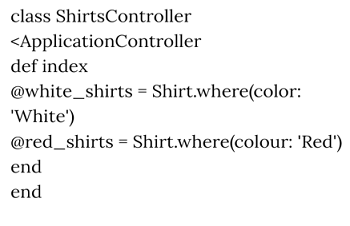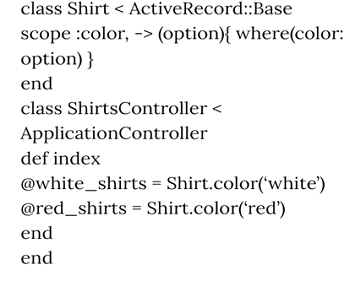Home »
Articles
10 Useful Tips For Ruby On Rails Developers
Learn about the top 10 useful tips for ruby on rails developers.
Submitted by Meravath Raju, on MAR 29, 2022
Excerpt: Ruby refers to the one topmost programming language. Rails imply the model or framework used to build websites using the high-level, general-purpose programming language Ruby. Ruby on rails is considered an open-source software that is best for building customized website applications.

Table of contents:
Introduction
Ruby provides an excellent model to website developers for all the codes. Ruby on Rails is created to ensure web application programming simple with the guesswork that every developer requires to get begun. A Ruby on Rails developer is typically responsible for penning server-side web application logic in Ruby around the model Rails.
Working with Ruby is somewhat complicated; however, by following a few real tips, you can make the task even easier. Here we are presenting 10 useful tips for Ruby on Rails developers, which will undoubtedly bring effective results if you can proceed with the instructions.
10 useful tips for Ruby on Rails developers
1. Don't put excessive logic in the Controller
This is one of the useful tips for Ruby on Rails developers. Rails are typically based on MVC architecture. One of the essential factors to raise the testability and readability of code is to manage a thin controller. For example, suppose you have a controller wherein the indexing process will take out the list of shirts of red and white colour.
In order to evaluate your skills in the Programming platform, Ruby On Rails training helps a lot.

To explain these questions more clearly, one thing can be done. Migrate this code to the database called "Shirt model" to take out the red and white colours. Then, you can notice how easy it is to write the Controller's indexing method.

It is suggested to follow the second approach when you are tackling Database questions in the controller process. You can have several logic options; however, the following are the best practices you can utilize in the Controller.
- The logic for the session and cookie managing
- The logic for delivering the result based on request type, such as HTML, JSON, XML, and more
- The logic for discovering the right framework to execute DB operations
- The logic for accumulating the parameters and utilizing that to run operations, depending on your needs
2. Don't put excessive logic in the model
Some specific functionalities don't have more to perform with the key responsibility of the Active Record model. They include generating email notifications and interfacing with external services. However, the primary functionality of Active Record is to search and execute CRUD operations in the database. This is another useful tip for Ruby on Rails developers.
Best logics you can use in Models
- Active Record relations as well as validations
- Access wrappers to conceal internal model data
- Straightforward methods that will update specialities and store them in a database
- Regarding database queries, try to stay away from using any Active Record queries out of the model every time
3. Don't put excessive logic in the view
ERB is considered an excellent way to construct your views. For this, it is required to embed Ruby inside HTML. However, you should be careful while constructing your views. Bigger view files are naturally hard to maintain, and this is an area where there is a chance of getting a facing code repetition. Sometimes, it links to violations, such as DRY.
Recommended better practices of Rails
- Always strive to use assistants in the views
- Use renderers, such as Draper gem. You will notice that it will assist you to diminish the code in the view files
- Use layouts as well as partials. while you feel yourself repeating
repeating multiple times in your views
4. Always check out your logs
All Ruby on Rails developers are aware of is that Rails has a default log file in development and production. Most developers will ignore the data in the files. But, it is not correct. Viewing the log files is vital while creating and testing your Apps. And this is necessary to keep watch on the flow of the processing. Moreover, reviewing log files is a brilliant way to detect incapabilities in your code.
5. Don't use excessive Gems
Every Gem added to your application can depend on other Gems, and likewise, other Gems can depend on some other Gems. Therefore, if you utilize enough Gems, the dimension of your Rails application will be larger than necessary. This can result in slow application performance in production.
Additionally, it may be linked to bigger server storage configurations and enhanced operating expenses. The adding of "Rails_admin" Gems will usually add 11 extra gems to your application. Additional 11 Gems may depend on a few other Gems. Hence, you are advised to take care while adding Gems to the application.
6. Write Automated Tests
A high-level test case needs to be written for every action in your Controller. In the future, if your application is expanded or upgraded to a newer RoR version from some perspective, this test structure can provide a smooth way to verify the primary functionality of your application. Apart from this, you may also encounter some flaws in the logic by writing test cases.
7. Always use Slim or Html Templating Language for your views
In the case of Rails uses the ERB templating system by default; this will enable you to embed Ruby code inside HTML. Therefore, always use Slim or HAML templates if possible. It is relatively lighter than ERB. Also, slim or HAML syntax is much simpler if we compare it with ERB.
Undoubtedly Slim is a fast and lightweight templating engine. Slim is very useful for code. You can achieve cleaner code and better readability by using Slim. Also, it can minimize the response duration of your request. The usefulness of Slim for building frontends is undeniable.
8. Background Tasks
There is no certainty that it will run smoothly if you use it to integrate third-party services into your applications through gems that call their API. So, to avoid blocking calls, you need to create these services as background tasks instead of calling them directly as normal requests in your Rails application.
Best Gems that can be used for this
- Sidekiq
- Delayed Job
- Resque
9. Useful Gems to organize code
- Traceroute: It detects unused routes in your application.
- Bullet: It is a powerful Gem that promotes application performance. Its work is to detect the N+1 query issues and display an alert message on your browser.
- Dead-weight: This Gem detects unused CSS selectors.
- Rails Best Practices: Its responsibility is to check code quality with the accuracy of Rails application and make necessary suggestions.
10. Some useful Ruby on Rails tricks
- Index: Database indexing is the easiest process to boost database performance. This will improve the collection of information from the database.
- Controller Variables: It is important that all dynamic data used in views is defined by controller variables.
- Views: Always avoid calling DB-related queries from your views. It will greatly affect the functioning of your Apps.
- Content tag: It is suggested to avoid content_tag in helpers. It's better to call them partially.
- SAAS: Switch to the SAAS approach to write your styles. This will act as a prevention for you from style overrides.
- Helpers: Rails by default produces one helper per Controller. But you need to eliminate them and use aspect-oriented helpers. For example, Link Helper, Form Helper, Image Helper, and Menu Helper.
Importance of Ruby on Rails to use for Web Application
The importance of Ruby on Rails is widespread. Ruby is a fairly easy programming language, and it can be the best choice for building web applications, thereby ensuring better performance of the apps. It has framed syntax, so it doesn't require excessive extra punctuation. Likewise, Ruby does not require extensive code to create a basic frame and is, therefore, considered streamlined compared to Java.
In addition, Ruby simplifies the task of using high-level abstractions, namely metaprogramming. A number of web applications are built using Ruby on Rails. App performance is excellent, and now those apps are leading in the App market. Building Apps using Ruby on Rails offers many advantages. Application developers are interested in using Ruby on Rails to design applications. In the TIOBE index, Ruby has secured 15th position.

Uses of Ruby on Rails
- Ruby on Rails is the perfect selection for developing online stores with elegant and sophisticated browsing and shopping options.
- If you want to create social networking websites, using Ruby on Rails will be helpful.
- For building efficient stock marketing websites, an excellent idea would be to use Ruby on Rails.
- Ruby on Rails has intuitive building features. Therefore, the optimized option is to use it to develop SaaS solutions.
- For creating Non-standard complex projects, Ruby on Rails can be a nice option
Benefits of Using Ruby on Rails
1. Ruby on Rails is a cost-effective
The principal benefit of Ruby on Rails is that it is a completely free as well as open framework. Developers also agree that Ruby on Rails is seamless to use. Adding a large number of Gems saves developers a substantial amount of time and labour.
2. Ruby on Rails provides Flexibility
When building web applications using Rails, it utilizes frontend and backend capabilities, and these are relatively easy to build. On Backbone, a single-page web application typically uses Rails. This makes the application dependent on Rails to achieve the perfect quality.
3. Secured development process
By default, the framework is installed and enabled using certain security measures. This means when you use Ruby on Rails; you are under a secure development process.
4. Ruby on Rails is Consistent
Ruby on Rails is very helpful in maintaining a project organized and understandable. This is because developers are bound to follow standardized file storage and programming conventions here. It is also a time-saving process.
5. Ruby on Rails increases Productivity
Using Ruby to build web applications allows you to create features much faster. The reason behind this is that Ruby is one of the most productive programming languages that seamlessly combines third-party software libraries.

Frequently Asked Questions
Is Ruby on Rails hard to learn?
It is true that Ruby on Rails is a complex framework; however, Ruby on Rails is not very difficult to learn. You need to be well acquainted with Ruby's mechanism, and then by following the right tutorials, you can learn Ruby on Rails seamlessly.
Is Python or Ruby better?
Python and Ruby are both popular programming languages. Python is relatively faster than Ruby. Python is widely used for websites or apps, including YouTube, Spotify, Google, etc., while Ruby is used to build websites which include Hulu, Kickstarter, Airbnb, etc. Both are best and dynamic. Python and Ruby are designed with different functionality. They come to fulfil needs in the programming community. However, the logic is different from each other.
Is Ruby on Rails reliable?
Of course, Ruby on Rails is a reliable and efficient software development program. You can effortlessly create database backend applications using Rails. It is easy to understand the code. Also, it makes your website comfortable and convenient.
What are the popular apps built with Ruby on Rails?
There are many apps that are built using Ruby for Rails for better performance of the Apps. The most popular apps built with Ruby include SoundCloud, Airbnb, Slideshare, Crazy Egg, Basecamp, Fiverr, GoodReads, and Hulu.
Conclusion
The mentioned useful tips for Ruby on Rails developers are beneficial for developers to guide them to build Apps using Ruby. Most of the developers search for optimized methods that save their time and effort in building a website. They expect something that can automate the tiring tasks associated with the website development process. From every point of view, Ruby on Rails is the right choice for developers who offer an innovative method to make their website development process smooth and economical.
Author Bio
Meravath Raju is a Digital Marketer, and a passionate writer, who is working with MindMajix, a top global online training provider. He also holds in-depth knowledge of IT and demanding technologies such as Business Intelligence, Salesforce, Cybersecurity, Software Testing, QA, Data analytics, Project Management and ERP tools, etc.
Advertisement
Advertisement